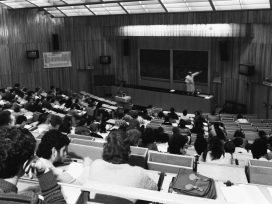Today, discussions about the role of universities concentrate almost exclusively on their contribution to the economic development of a country or region, and more specifically on how universities can contribute to countering unemployment and improving competitiveness. This priority is powerfully illustrated in the justification for the so-called Bologna process, in particular the change from the conventional Diplom and Magister to the BA and MA. The argument is that the international alignment of measurements for academic performance will increase the competitiveness of European universities with regard to their US counterparts and enable them to better prepare graduates for competition on the international job market.
On the whole, the frame of reference for the definition of the role of the university rarely goes beyond this aspect of economic competitiveness. In view of growing unemployment, this is understandable enough: experience shows that knowledge, education and training provide the best chance of reducing unemployment and stimulating the economy, especially through innovation. Yet the tendency to limit the role of the university to this aspect must, I believe, be overcome, because it leads to cultural impoverishment and neglects the broader perspective on education in a liberal democratic world society. In the long term, the consequences of this could be severe.
What is the purpose of education in democracies?
It is generally accepted that education guarantees the existence of the long-term normative democratic framework in which it is situated, as well as meeting the empirical challenges – for example the transformation of work – that we will encounter in the foreseeable future. I would like to explore the implications of this for university education, an area I consider myself more qualified to speak about than I do the school sector. What educational goals should universities devote themselves to in democratic conditions?
Let me disregard, for the moment, the fact that today this question is often considered superfluous, because on the whole the economic relevance of academia and universities is almost exclusively at the centre of attention, as if it went without saying. Traditionally, the extra-economic goals of universities are said to be “cultural formation” (Bildung) and “training” (Ausbildung). Often, these two goals are contrasted to one another, with the non-instrumental development of the personality seen as being antithetical to training for the job market. This usually comes with the warning that today universities can no longer educate for the sake of academic knowledge alone – as if they had ever done that in such a narrow sense.
Of course, deep-seated insecurity about the form the labour market will take in the future has increasingly caused higher education’s goal of preparing graduates for employment to be called into question. We no longer know what the labour market of the future will look like and what professions and skills higher education should be geared towards. However the labour market is not imposed upon us like fate, but can to a great extent be influenced. For example, global competition can trigger varying reactions from companies: they can transfer labour-intensive production to countries with low wages, they can intensify labour domestically in a Taylorist manner, they can replace the workforce with machines, or they can turn to work and innovation-centred production procedures – for example cellular manufacturing. The last of these solutions has the best future, according to specialists. However it requires highly qualified employees.
In the 1990s, the Italian firm Fiat wanted to introduce cellular manufacturing into its new factory in Melfi. Because of a shortage of qualified workers in the immediate area, however, Fiat opted to scale down its plans significantly. The result will be less demand for qualified workers in the future, more monotony in the work of many, and the creation of a social schism between low-qualified and highly-qualified workers. If one wishes to avoid this, then high-level training geared towards independence, creativity and responsibility can certainly be worthwhile, even if there are no prospects of concrete application on the labour market. It is the existence of a highly qualified workforce that provides innovative companies the chance to move in new directions in the first place.
This example supports the increasingly common view that good and “sustainable” training by no means stands opposed to education in the broader sense. Because the future is open, the important thing is no longer the acquisition of technical skills or information, but individuals’ ability to develop independent categories for the growing volume of information and “world experience” as a whole. Doing so enables individuals to attain reflected knowledge that goes beyond mere information, to develop new ideas, to take initiatives, and to implement these in collaboration with others.
All these steps demand a high level of reflection. This pertains, on the one hand, to the methodological and theoretical bases of information and knowledge. This alone requires perseverance and above all patience, given the uncertainty concealed in every method and in every theory – the reason why there is no such thing as secure, easily manageable knowledge without consideration of its conditionality. This is the case even for the smallest of observations. “There is more to observing than might be observed”, as the philosopher and cognitive theoretician Günter Abel put it. Measured against academic standards, not to mention the latest research, the cognitive-theoretical naivety to be found in countless defences of the new knowledge society, including highly official ones (often hidden in bureaucratic language), is outrageous in my opinion. As if knowledge were something that can be used like a shovel.
On the other hand, reflection pertains to reaching an understanding with those with whom I strive to obtain knowledge, those with whom I enter into exchange, and those with whom I cooperate. Whoever is not used to reflecting on the conditions for their own acting and thinking will find it difficult to enter into discussion with others about the matter in hand, and, in complex contexts and situations, be unable to follow them and act together with them.
This ability to reflect, as I have briefly described it, is a prerequisite for higher education if it is to be both open to the future and capable of surviving in it. At the same time, it is an essential feature of education in the broad sense of “culture”, seen since the Enlightenment as the route and the goal of the development of the personality. Of central importance here is the sovereign activity of the individual, which consists, among other things, in self-reflection, as the means by which the individual becomes a moral subject. Education is not a tradable or a prestige-guaranteeing commodity that enables, in Nietzsche’s sarcastic phrase, the educated bourgeois citizen (Bildungsbürger) to become an “educated philistine” (Bildungsphilister). Rather, it is the ongoing effort with which a person understands the world, acquires moral orientation, and subsequently acts responsibly. A person reflexively compares every experience to their previous experience, aware that there is no such thing as a total knowledge that one can simply lean on, a knowledge that no longer requires reaching an understanding with others. On the contrary, the progress from singular information to knowledge, commonly understood as the attainment of an increase in certainty over that which is said or assumed, consists in the paradox confirmation of the principle uncertainty of knowledge and the limits of its validity. The knower knows the limits and the hurdles regarding every presumption of certainty better than the person who is merely informed. The knowledge of uncertainty thus indicates progress in understanding. Kant’s Critique of Pure Reason, the “Copernican Revolution” of cognitive theory, behind which so many contemporary rhetoricians of the knowledge society lag, offers the basis for this understanding of education. It is much more modern and above all enlightened than many pseudo-progressive positions that proclaim, without reflection, the knowledge society to be a given fact or even a goal.
Justifications for the necessity of lifelong education that refer to the so-called “half-life” of knowledge indicate a thoughtlessness that needs to be uncovered if we wish to assess and determine the goals of the university under conditions of an excess of faith in computers and the flood of information. Genuinely reflected knowledge does not lose its validity after three months like information on a travel timetable. The crucial thing is to develop a knowledge that is long-lasting because it is reflected, for which knowers themselves are responsible; a knowledge that cannot be reduced to a series of ciphers that one puts in little boxes and adorns with arrows that function as causality, but a knowledge that realizes itself through the praxis of experienced reflection, and that depends on an ongoing process of negotiation with itself and with others. Plato’s Dialogues and Artistotle’s Metaphysics have remained contemporary for over a millennium because thorough thinking, in a process of argumentation and counter-argumentation, spares diversions and retains its validity – even though this validity is in principle incomplete, in other words always relative, or more precisely: “relational”.
The essential political dimension
While “cultural formation” and “training” may no longer represent fundamental opposites in a future marked by rapid technological change, the question nevertheless arises as to whether the political dimension of the concept of education sketched here, i.e. the coupling of education with moral and civic responsibility, remains meaningful for the future of the university. Isn’t science notoriously “value-free”? This, at any rate, is what is often maintained, with Max Weber cited in support. Of course, this misunderstands Weber, who merely wanted to identify the value judgements that are inevitably involved in every scientific analysis and to avoid claiming universal validity for them. This does not only apply to the human and social sciences. The methods of the natural sciences and medicine (if one counts the latter as a separate science) always involve pre-formed understandings about reality or about human beings, which include value judgements. Often, preserving the reliability of a tried and tested method is considered more important than asking far-reaching questions, with the result that segments of reality or possible causal relationships are excluded from the analysis.
So do we also need to define the aim of the university politically? Is that even possible? Or does the logic of economic globalization force us to forego political agreement, democracy, freedom and justice for the sake of economic efficiency, self-assertion and survival? To put the question more pointedly: is not the idea of politics contained in the Enlightenment concept of education, its concept of the politically responsible citizen, i.e. the citizen that acts in the interests of the community (defined as the nation-state in which he or she was born), obsolete, even impossible?
These questions are by no means academic, especially when it comes to the education of future decision-makers, people who will occupy high-level positions of responsibility. Here, too, there can be no purely objective, let alone binding answer. The political scientist Fritz Scharpf, in his system-theoretical view, refuted the argument that politics would be obsolete in the future. Yet he did so not simply on the basis of theoretical or empirical arguments, but above all from a normative, perhaps even moral impulse not to allow problems to take care of themselves, and instead, despite all the difficulties, to shape circumstances. Scharpf did, however, attach one condition to the possibility of politics in general and democratic politics in particular (i.e. a politics based on discussion and agreement, which is what concerns us here): the capacity for multilingualism. What this means is a familiarity with more than one area of reality and society, an ability to speak different “languages” (Niklas Luhmann would talk of “codes”). Without this ability, we cannot reach understanding with one another or comprehend one another’s life worlds and experiences, and instead talk at cross-purposes.
Multilingualism is the sole means with which to prevent the inevitable specialization of our knowledge and activities narrowing the horizon of our reality to such an extent that the result is a distortion of truth and even – because we are no longer able to predict the consequences of our thoughts and actions – structural irresponsibility. We will then become, as Thomas Mann put it, “limitlessly narrow minded”, and that could cost us a great deal. If we wish to continue to influence the world in which we live, then we must become increasingly multilingual.
Is not the civic-political dimension of the Enlightenment concept of education a possible component – and what’s more, a necessary one – of universal education, and thus a goal of the university? The answer is yes, if we consider it important to see off the danger of partial blindness and structural irresponsibility; if we comprehend the notion that survival on this earth and the suppression of growing violence is connected to moral and political conditions such as freedom and justice, not just for us but for everyone, because we can no longer isolate ourselves; and if we bear in mind that the development of a liberal democracy based on minimum standards of justice is a prerequisite for our common survival in a shared world. This would be a fundamental and far-reaching goal to which the economic efficiency and technological transformation of the university would have to be subordinated.
Does this conclusion remain valid despite the increasing inability of the nation-state to make political decisions? Yes, all the more so! As a political form, liberal democracy may be tied to time and place, because politics cannot be legitimated in any other way. However the site of political authority need not be congruent with that of the nation-state. There is much to be said in favour of “warping” or distributing the sphere of decision-making onto the supranational level on the one hand, and onto to the regional level on the other, thus forming a network of “governance” whose actors, alongside those mandated in the traditional fashion, will be large international organizations, multinational companies and civil society (NGOs). In this complex network of governance, democratic politics will be successful insofar as problems are approached and responses decided upon with an attitude of civic responsibility; by people who have learned to look beyond their own immediate interests, their own life worlds, professions, specializations and world views, people who are able to understand and empathize with others, reach understanding “on the spot” and find lasting and durable solutions. The more independent they are, the less dependent on approval from above, the better.
Ability to reach an understanding
It seems to me that in democracies, the broad goal of higher education in the future is the ability to reach understanding. On one hand, this means reaching understanding of the cognitive prerequisites of our own knowledge, thinking and acting; a reflected knowledge of various areas of reality and hence of science; an interest in other historical experiences and cultural influences. On the other hand, it means the ability, the fantasy and the will to understand and empathize with others and other ways of thinking, and to act together with others in the spirit of freedom and justice. It is not insignificant that the term “reaching understanding” combines a (seemingly) purely intellectual-cognitive sense with a moral one. Both senses are indispensable. For both, it is about comprehending the new – its logic, its inner construction, its consequences. This is the prime element of research. However, it is also increasingly crucial, for life and for survival, to reach agreement with others, to come to them with clear ideas and with the willingness, if conflict exists, to reach equitable solutions. That can only happen if one avoids becoming encapsulated in one’s own field of life and knowledge, and instead, reflecting on one’s own world, understands others.






